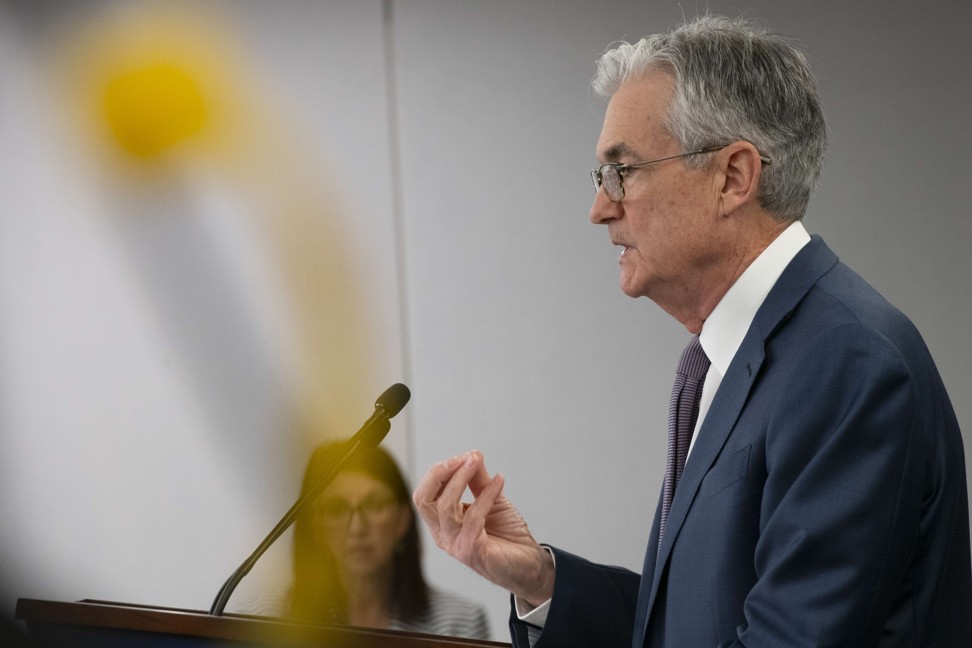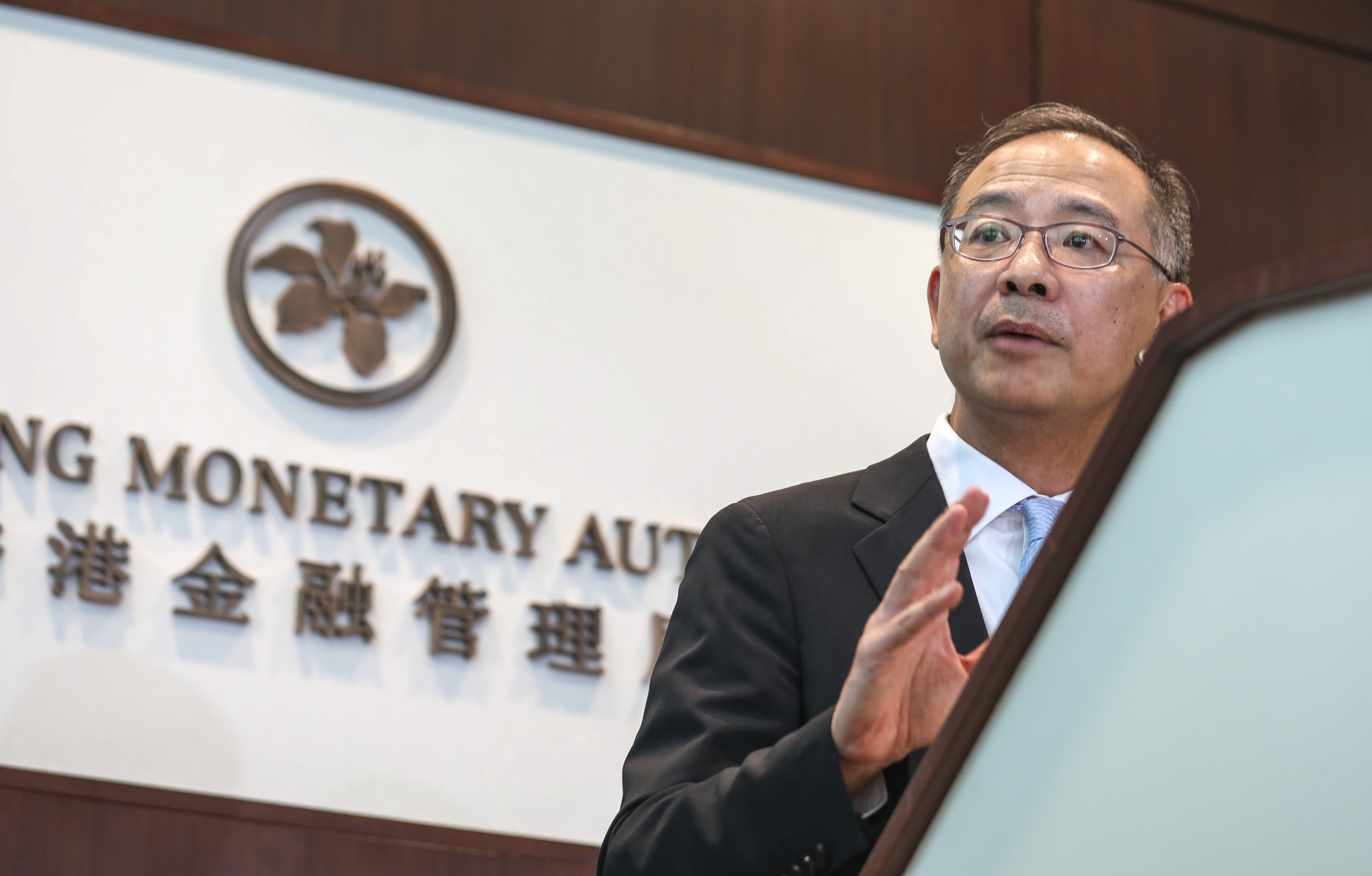
Hong Kong cuts interest rate after US Fed’s surprise move to bolster sagging economy as coronavirus outbreak spreads worldwide
- US Federal Reserve cut interest rate by 50 basis points, the first emergency reduction since the 2008 global financial crisis
- The Hong Kong Monetary Authority, which runs its monetary policy in lockstep with US policies, followed with a 50 basis point cut
The Fed trimmed its key rate by 50 basis overnight, two weeks before its scheduled meeting on March 17 and 18, as Chairman Jerome Powell said he “saw a risk to the economy, and chose to act.” The move was the first inter-meeting rate action, as well as the biggest cut in a single fell swoop, since the collapse of Lehman Brothers Holdings in 2008 roiled global financial markets.
Hong Kong’s de facto central bank, which runs its monetary policy in lockstep with US policies to maintain the local currency’s peg to the US dollar, followed with a 50 basis point cut to 1.5 per cent, effective immediately, the HKMA said in a statement posted on its website.
A cut in the base lending helps reduce the cost of money, aiding Hong Kong’s borrowers in weathering a retail and consumption slump that last year drove the local economy into its first technical recession in a decade. The HKMA cut the official lending rate three times in 2019 by a combined 75 basis points, following nine consecutive increases totalling 225 basis points between 2015 and 2018.

The Fed decision shows the central bank “would proactively use its monetary policy to mitigate possible economic risks posed by the coronavirus,” HKMA’s chief executive Eddie Yue Wai-man said in a statement on its website. “However, further developments of the coronavirus are still very uncertain and financial markets will continue to see considerable volatility. Investors should manage their risks prudently.”
The HKMA will continue to closely monitor market situation, and maintain orderly operations of Hong Kong’s money and foreign exchange markets, Yue said. It will also ensure stability of the Hong Kong dollar peg, he added.
Earlier Tuesday, the Reserve Bank of Australia lowered its key interest rate to a record low of 0.5 per cent, a fourth reduction in the past 12 months, partly to support the economy wrecked by bushfires. Malaysia’s central bank also eased its overnight policy rate on Tuesday to 2.5 per cent, a second cut this year, citing the coronavirus impact on regional economies.
The Hang Seng Index fell 0.2 per cent at the close of trading on Wednesday, after earlier losing as much as 0.9 per cent. The Hong Kong dollar recently traded at HK$7.7684 per dollar versus HK$7.7705 on Tuesday.
“The surprise action has caught investors off guard, and instead of calming market participants, the unexpected rate cut created greater anxiety surrounding the spread of the coronavirus,” said David Chao, global market strategist of Asia Pacific (ex-Japan) at Invesco. “Market participants should expect additional interest rate cuts by other Asian central banks and even from developed market central banks as well.”
The Hong Kong government last week unveiled a record HK$139 billion (US$17.8 billion) budget deficit to help revive the economy. The coronavirus outbreak this year has continued to dent tourist arrivals and retail sales in the city, threatening to deepen the slump brought on by months of US-China trade war and anti-government protests in 2019.
The economic slump has weighed on property prices, causing commercial banks to reduce their valuations of mortgaged real estate and pushed more borrowers into negative equity. Financial Secretary Paul Chan Mo-po’s budget proposals last week included a one-off cash handout of HK$10,000 to every permanent resident in the city.
Hong Kong’s biggest banks find themselves in a vice as they cut rates for the first time in 11 years during city’s recession
“Interest rate cut buys time but, by itself, cannot adequately address a health care crisis, which is the current root cause of potential economic distress,” said Sim Moh Siong, currency strategist of Bank of Singapore in a research note. All governments need more relief measures to boost the weak economy, he added. Policymakers in Canada and the UK could follow the Fed’s lead, Sim said.
UBS also believes the Bank of England, the European Central Bank, and the Swiss National Bank could do the same, while mainland China will announce more fiscal support to exceed 2 per cent of GDP this year in addition to recent corporate tax cuts and emergency spending worth 1.2 per cent of GDP.
For Hong Kong, the surprise rate cut may only benefit short-term borrowers who use margin financing for speculating in the stock market, or those who pegged their mortgage rates to the Hong Kong interbank offered rates, or Hibor.
HSBC and Standard Chartered Bank, the two biggest lenders of the city, said on Wednesday that they would maintain their respective prime rate at 5 per cent and 5.25 per cent, after easing them last year amid citywide social unrest to what some lenders described as the floor.
A substantial part of home mortgages in the local banking industry is based on the prime rate, the rate banks charge their best customers.
“Overall, it is expected the US will cut down the interest rate one to two times, and Hong Kong will continue to maintain a low interest environment,” said Thomas Lam, executive director of Knight Frank, a real estate consultancy in the city. “This will support developers, property investors and will help support property prices.”



